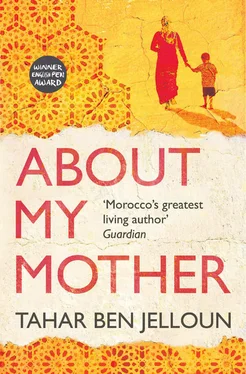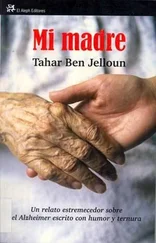All the female cousins of her age are here, laughing and joking, proud to accompany the youngest of them to the hammam ceremony. They each have a brass bowl. There are around ten of them. Ambar, the black girl who used to be Moulay Ahmed’s slave, takes charge: ‘Follow me, gather round our princess, our beauty, the gazelle who tomorrow will be given to a good man, a man from a fine family, the man who’ll make her happy and give her children. May God bless them and bring them joy.’
The entire hammam has been hired for the occasion. Zubida, the attendant, greets the procession with a string of ululations. Ambar calls on the Prophet and his companions. The women who will wash and massage their bodies — the tayabates — are waiting. The cousins undress, leaving their clothes at the entrance, next to suitcases containing new outfits, and enter the hammam squealing with joy. The cousins tease Ambar, whose enormous breasts make them laugh. She’s fat but she doesn’t care. Her breasts hang like heavy fruit. The girls are proud of their firm little busts. They touch and tickle one another, giggling, slithering around and almost falling over. A masseuse takes the bride-to-be in hand. She strokes her slowly, washes her, and then begins to give her a thorough massage. After a while, feeling tired, Ambar asks if they can rest for a moment, just to eat a few oranges. They move from the steam room to the warm room. Here, they can breathe. They eat, drink cool water and relax, then go back to the steam room to finish cleansing their skin. The masseuse shows them how to scrub away the dead skin painlessly. She tells them: ‘This is the cemetery of useless skin.’ It’s also the place where everything superfluous is removed. Hair — oh, hair must be removed. When the husband goes to bed with his gazelle, he must encounter only softness, a smooth skin, velvety and beautiful — everything that he is not. ‘You see, girls, a woman’s skin must be pampered, her entire body must be prepared. Her mind too must be readied, but on the wedding night, it’s her body that’s being tested. A word of advice for our lovely gazelle who’ll be given to her husband tomorrow: slide through his hands like a fish, don’t give yourself to him straight away, make him chase you a little, let him win you. You smell good, you’re ready, there isn’t a hair on your entire body. You’re a ripe fruit, but he has to make some effort. Be obedient, of course, but you’re also allowed to play a little. After all, you’re still a child, a girl of barely fifteen!’
Now comes the taqbib: the tayabates have filled seven buckets with water, some hot, some warm. They dip their bowls into them and pour the water over the head of the bride-to-be. They claim that the bowls they use for scooping the water come from Mecca. After the seven dousings, they announce that the gazelle is under the protection of the angels.
Three hours later, Ambar notices that the gazelle can’t take any more, she’s fainting. Ambar picks her up and carries her to the room where the steam is bearable. She wraps her in a big fouta — a bath towel bought for the occasion — and takes her to the resting room. She gives her a glass of milk, then makes her inhale a strong perfume. The girls join her. To comfort her, cousin Aisha says whatever comes into her head: ‘It’s all the emotion, the fateful day is getting closer. You’re so lucky, when will it be my turn? I’m too old, almost twenty and still not wed. I’m the eldest and my younger sister was married before me, the world’s upside down. But I’m pretty — not as pretty as you are, but I can wait. What’s been written for me will come to pass … I won’t end up on the shelf …’
My friend Dr Fattah made me a promise: if Mother’s health suddenly deteriorates, he has a duty to let me know. He calls me in May. I can tell it’s serious from the tone of his voice: he speaks gently, weighs his words and simply says what needs saying. The next day I’m at her bedside. I see she’s in the room where my father died, ten years earlier. My first impression is the worst: the colour of her skin, pale and jaundiced, her glassy eyes staring at the ceiling, her lower jaw contorted and sucked in, mouth wide open, gaze vacant. My mother, visited by death. With tears in his eyes, my brother says: ‘I’ve arranged to see El Haj, our cousin. He knows what arrangements we need to make for the grave and the funeral: her condition is hopeless.’
Despite what I see, despite the doctors’ very guarded prognoses, my intuition tells me otherwise. My mother isn’t about to die. Not this time. She doesn’t know where she is or who is around her. I take her hand and speak to her softly. Close family members come and go. In her rare lucid moments, she gives orders to Keltum to start cooking dinner and laying the table, insisting the tablecloths be clean and ironed. We take turns at her bedside, but my sister and Keltum never leave her.
How to pass the time at my mother’s bedside? Once the high emotion has subsided, you begin to get bored. There’s nothing to do. You greet visitors, you answer the phone, you keep an eye on her breathing. You wait for the doctors to come, you stare at the walls, following the lines of cracks caused by damp. You gaze at the ceiling. You do nothing. You wait, you chat to the nurses. I’ve learned things about this private hospital. Not so nice, some of the things that go on here. Money makes people crazy. Some nurses are paid 1,000 dirhams a month, others aren’t paid at all because they’re considered trainees. Public hospitals aren’t much better. I prefer a well-equipped, efficient hospital to a Parliament where people spend hours pontificating. But that’s another story. It all went well for my mother, this time. We paid in advance, slipped some fat tips to the nursing staff. The doctors were competent.
When she left the hospital, she had no idea what had happened. There was no problem taking her home. She thought she’d just moved to a different bedroom and then a different house. She had no recollection of her stay in the hospital. Just as well. My mother’s dearest wish can be summed up by this prayer: ‘May God let me die in your lifetime!’ She is distraught at the thought of losing a child, as any mother would be. She saw how her own mother had suffered when one of her sons died prematurely. A fathomless grief. Something she daren’t even imagine — it is too painful. ‘I’ll die, yes, but with my children all around me.’
I’ve come to understand that demand: it stems from her all-consuming love. What do you do with that love if one of your children is carried off by a brutal death — called back to God, as she says? Muslim mystics, the Sufis, talk about God’s love in very similar terms. My mother was no mystic but she celebrated the simple things and essential values. She did this by giving of herself, without making an issue of it or suffocating her children. One day, during a radio broadcast, I said that my Muslim mother was a ‘Jewish mother’ and I added, ‘a Jewish mother who doesn’t smother’. She’d say to us: ‘I’d die for you: my heart never gives up, it keeps me going. Whenever I’m worried about you, my heart pounds, my love chokes me. That’s just how I am: there’s nothing to be done, I can’t help it. You can laugh, but when you have children of your own, you’ll understand the kind of worry that burns in your chest. I’m always thinking about you, and I’m scared by the way people look at you. The evil eye is real, you know, and frighteningly powerful, it reaches everywhere like an octopus, seeking out happiness to destroy. There are people who want to hurt you just because you have your health, because you exist. God keep you safe from people’s evil looks! May He protect you from their venom! May God lift you above their cruelty and make you a light to guide those who live in the dark! The human heart isn’t always kind. But it’s not in my nature to be suspicious. I believe what I’m told. I trust that people are sincere and act in good faith, but I just cannot lie and pretend. That’s why I get hurt, but I’d rather be as I am. It’s the way I was brought up. My mother was the same. My father was a saint; people came to him for advice. He was known for his kindness and his learning. I inherited that goodness from him but sometimes it doesn’t do me any favours. But no matter! I have you and that’s what counts … That’s why I ask God in His mercy to let me go, surrounded by all of you. We’ll pray together and I’ll go gently, like my mother.’
Читать дальше












